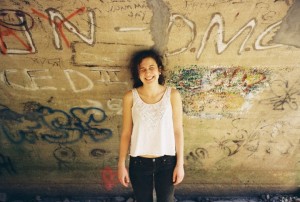Originally posted on Pursue: Action for a Just World.

At school, we always complain that we’re not doing anything. In my classes, we study feminist theory, race theory, queer theory, postcolonial theology, postmodernist thought, liberatory pedagogy; an alphabet soup of academic jargon about justice. But what’s missing, we object, is action. So we work to reform our college policies, classes, and culture, offering peer education classes, bringing speakers to talk about social change, facilitating discussions on race, gender, class – but still, it doesn’t seem like the “real world.” It’s still isolated and primarily academic, and in between trying to change real systems, we’re spending a whole lot of time writing papers.
Up until this summer, I somewhat resented that. Now, don’t get me wrong, I’m a huge nerd, and I like academics, but I also longed to focus on the doing part, to press pause on the papers and the discussions for a moment and actually do some work. And even though my women’s and gender studies professors assured me that in their classes knowledge is not for knowledge’s own sake, that our exploration of oppression and privilege should serve as a sort of academic, contemporary consciousness-raising circle that rouses our passion for social change, I was still suspicious of the academic world. So what if we’re studying the radical pedagogy and curricula of the Freedom Schools if we’re not using it to empower people? So what if I’m writing papers on Judith Plaskow and Mary Daly’s critiques of male God language if I’m still praying at synagogues with traditional siddurim? At the end of the day, it’s what you do, not what you’re thinking about… right?
So where do I end up this summer, but Pursue. Pursue is a convener, an organization with multiple entry points to multiple justice issues, offering educational events and opportunities for action. Pursue straddles that very tension I have always felt between education and action, intellect and involvement, learning and doing. But I think what working here has taught me most is that volunteering at a community garden in a low-income neighborhood is significantly enriched by having a solid grounding in what food sovereignty means. Taking the time to explore all of the interconnected pieces of food justice, from the local to the global, from the politics of Food Aid to the racialized history of farmworkers’ rights, from the impact of capitalism on common spaces to how just planting a seed in a raised bed can be a radical political statement, can deeply augment your action. Intellectual explorations aren’t peripheral or secondary to social change, they are essential. Or as Paulo Freire writes in Pedagogy of the Oppressed, “liberation is a praxis: the action and reflection of men and women upon their world in order to transform it” (79). Throughout the summer, I’ve kept coming back to the concept of praxis, the importance of both reflection and action, and that even effective and valuable action “requires theory to illuminate it” (125).
The combined power of reflection and action has come shining through in my adventures with Pursue this summer. My conception of the rights-based approach to development and empowerment models was strengthened by text studies and a book club on Peter Uvin at AJWS. My attendance at Uri L’Tzedek’s protest at Apax Headquarters last week where we demanded justice for immigrant workers was deeply enriched by my conversations about the place of workers’ rights in the food movement. Tabling for JFREJ’s Shalom Bayit: Justice for Domestic Workers campaign was augmented by a conversation we had on intersecting identities, and how the definition of work is colored by gendered notions of the public and private.
In these ways, I’ve appreciated the power of learning, reflection, and even theory to illuminate activism. In “Theory as Liberatory Practice,” Bell Hooks identifies theory as a potential location for healing, a tool for explaining her reality and understanding her own positionality, and blurs the dichotomy between reflection and action. So at worst, theory can be paralyzing, isolating, and elitist, and reflection is not enough to effectively pursue social justice. But at best, theory is enabling and meaningful; it enriches our activism and can even facilitate healing and growth. And overall, that’s what this summer has done for me.
Chloe Zelkha is a student at Carleton College and recently completed her summer as an AJWS intern with the Pursue team.
AJWS’s work in countries and communities changes over time, responding to the evolving needs of partner organizations and the people they serve. To learn where AJWS is supporting activists and social justice movements today, please see Where We Work.

